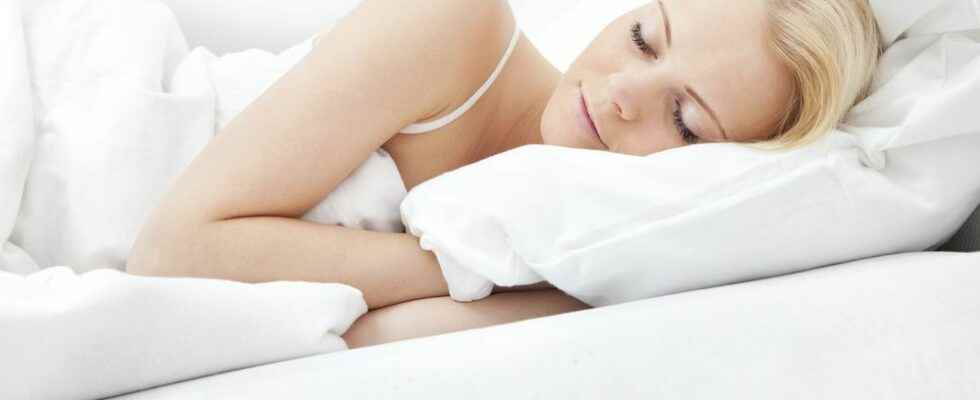A badly heated room, the walls covered with cupboards overflowing with medical files. Here is Simon, a young computer scientist with disturbed sleep since the Covid. Anita and Yolande, two retirees who can no longer stand their long night hours tossing and turning in their bed. And Sidji, a quadra who couldn’t get up before 3 p.m., exhausted by her sleepless nights. We are at Bichat Hospital (AP-HP), in the north of Paris, and all four have been meeting here every other Thursday for several weeks now for a “behavioral and cognitive therapy” (TCC) workshop. A practice based on advice, explanations, support and exercises, to help fight against insomnia. Imagined in the 1980s, this method has since been widely validated, even if it is still unknown to the general public: “In all international consensus, this is the reference treatment”, confirms Sylvie Royant-Parola, psychiatrist and president of the Morpheus network.
Simon, Anita, Yolande and Sidji have placed their “sleep diaries” in front of them: a table in which they have noted, day after day, their times of going to bed, falling asleep, waking up and getting up. “Anita, I see that you continued to take sleeping pills, you really couldn’t do without them? In addition, you always stay in bed for an hour before swallowing them…”, launches the psychologist Loli Tamparillas. Embarrassed look from the ex-maths teacher: “I always hope to fall asleep without it and that never happens. So I end up taking it, because otherwise I know that the next day it will be horrible and that I won’t be able to do everything I have to do… “
Defusing the Faulty Thoughts and Behaviors of Insomniacs
In two sentences, Anita illustrates many of the typical – and mistaken – behaviors and thoughts of insomniacs: focus on sleep, ideas that are too general and definitive, excessive time in bed, long-lasting sleeping pills. The objective of the CBT: to defuse them. “Sleeping pills are useless, I have already told you. What prevents you from falling asleep is precisely this hope that you maintain. When you swallow the tablet, you finally allow yourself to let go. And then , is it so bad not to sleep? No! The next day you will feel a little uncomfortable, but in reality, when you have important things to do, you get there, right? With this kind of ideas, you feed the anxiety that keeps you awake”, decrypts Loli.
Simon agrees: “When my roommate has an all-nighter, she doesn’t care. Me, I always tend to tell myself that it’s a disaster”. The interest of group workshops: sharing experiences, and above all becoming aware of bad perceptions, which are always easier to see in others… The young man assures us that he has put into practice certain advice from previous sessions, and a little sleep better. He no longer goes to bed unless he feels tired, relaxes in the evening and tries not to pay attention to the little voice of his thoughts. In his case, listening to podcasts: “Why not”, answers Loli. But he also started to take a nap, and the psychologist likes it less: “I’m not against it in general, but not in your case, she explains. Your goal is to sleep better at night, not during the day. So you have to force the machine a little, so that the sleep pressure is maximum in the evening. “
“CBT is the opposite of psychoanalysis”
The session continued in this way for nearly two hours. Sidji, who now gets up around 11 a.m., commits to getting out of bed at 9:30 a.m., regardless of how good his previous night was. “The regularity of getting up is essential”, repeats Loli. Yolande, she promises not to spend hours lying down waiting for sleep: “If you can’t sleep, you have to get up for a while. When you stay in bed without sleeping, you associate bed and anxiety, it creates a conditioning”, explains the psychologist. At the end, everyone leaves with recommendations to put into practice by the next session. “CBT is the opposite of psychoanalysis: we do not seek to discover the root cause of the disorder, but to understand why it persists, and to rely on concrete and scientifically validated actions to help patients “, summarizes Loli Tamparillas.
Many studies show that the method is effective and durable, “except in cases of very severe insomnia, with less than five hours of sleep per night, against which new drugs could be interesting”, recognizes Pr Renaud Tamisier, president of the Scientific Council of the French Society for Research and Sleep Medicine. Unfortunately, this therapy remains inaccessible in France: “About 500 doctors and psychologists are trained for at least 5 million chronic insomniacs. We are very far from the mark…”, sighs Sylvie Royant-Parola. But e-health could provide answers to patients without a solution. The United Kingdom has already taken the plunge: Sleepio, an application developed twenty years ago by a doctor, is now reimbursed there. Nothing like this in France for the moment, because this innovative offer, packed with artificial intelligence and very interactive, should not be confused with the banal generic advice on sleep hygiene found on apps dedicated to sleep.
Prof. Pierre-Philip has nevertheless been working since the first confinement on a tool similar to Sleepio, in French, with its CNRS unit: Kanopee, available free of charge on the App Store and on Google Play. It allows you to quantify and monitor your sleep, your physical activity, your state of fatigue and your morale, to take stock and follow up with an electronic sleep diary and a support program. The first results are interesting: users gain forty-eight minutes of sleep compared to using an advice site, according to a study published in the scientific journal Journal of clinical medicine. What give hope to many insomniacs.
